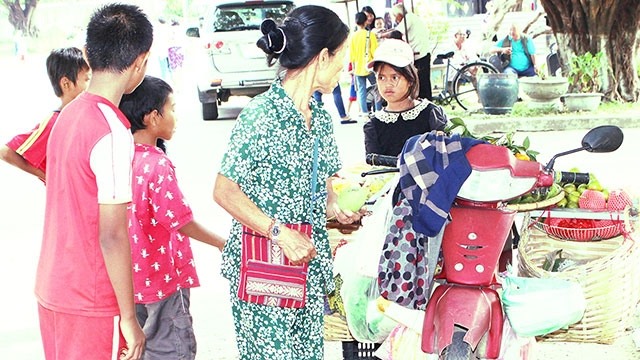 Society
Society

Everyday fully-loaded motorbikes reach the most remote areas of Cư Prao Commune in Ma Đ’rắc District, Central Highlands province of Đắk Lắk to distribute fresh food and essential items. They are the life-blood of the remote ethic areas.
 |
| The motorbike vendors stop at every doorstep of local houses and sell food and necessities to ethnic people living deep in the mountains. — Photo nhandan.com.vn |
Hà Văn Đạo
CENTRAL HIGHLANDS — Everyday fully-loaded motorbikes reach the most remote areas of Cư Prao Commune in Ma Đ’rắc District, Central Highlands province of Đắk Lắk to distribute fresh food and essential items.
They are the life-blood of the remote ethnic areas.
The so-called ‘motorbike vendors’ stop at every doorstep and sell necessities to those living deep in the mountains.
Living far from district’s centre meant on every shopping trip, the people in Cư Prao Commune used to buy lots of meat, fish and vegetables to store at their houses for many days.
With limited refrigeration, the food would get rotten and would often need to be cooked and cooked again many times in the same day.
This caused sickness and food poisoning.
Trần Văn Toản and other locals decided enough was enough, and needed to find a solution.
They donated money to buy a motorbike, travel to market each morning to buy hundreds of kilos of food and essential items and then sell them to local people based on their demand at the same market prices.
To ensure quantity, Toản notes down demands of each household and also tells them how safe the fresh food is.
Lê Thị Tươi, a vendor of Cư Pui Commune, Krông Bông District says it takes the whole day from early morning until midnight to ride the bike to reach the furthest areas like Ea Rớt Village.
“I always tell village leaders and the elderly to remind local people that clothes can be kept for a long time, but not food,” she says.
The whole village has only a few houses with refrigerators so vendors have to bring food to locals once every few days. There are about 50 motorbike vendors like Tươi in Ma Đ’rắc and Krông Bông districts. Their busiest time of the year is spring.
Concerned with food poisoning cases, Lê Thị Hậu of Đắk Glei District’s Đắk Choog Commune, Kon Tum Province decided to buy a small truck and drive five hours to bring food and items from the central market to local villages.
“All the food and essential items are carefully selected at slaughter houses and farms. At the peak season around Lunar New Year holiday, my ‘commodity list’ records up to six tonnes of pork, two tonnes of beef and 900kg of fresh fish,” she says.
The vendors have to park their cars on the main road and walk to the villages which vehicles cannot reach. Despite travelling a long way to reach every home, vendors don’t overcharge. In return, they buy vegetables, herbs and rice cultivated by ethnic people to sell at central markets.
The vendors have helped bring safe food to the ethnic communities and less and less people are getting sick.
But they are so much more than just food deliver men and women.
Motorbike vendors have also become culture preservers who teach locals, most of whom have never left their villages before, traditional folk songs, dances and other cultural values, bringing happiness to the remote areas.
Vendors who usually stay overnight at local houses advise ethnic people to eradicate bad customs such as early marriage, holding alcohol drinking contests or giving birth to too many children. — VNS